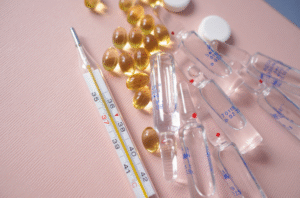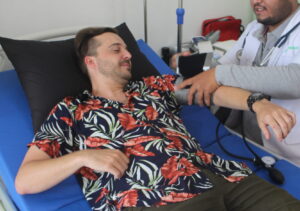What is Bali Belly?
Medically, Bali Belly is acute gastroenteritis, an inflammation of the stomach and intestines. It is most often caused by consuming food or water contaminated with bacteria (like E. coli or Salmonella), viruses (like norovirus), or parasites.Symptoms can range from mild discomfort to more severe issues and typically include:
-
Abdominal pain and cramps
-
Frequent, watery diarrhea
-
Nausea and/or vomiting
-
Mild fever
-
Loss of appetite
-
Fatigue and weakness
Symptoms usually appear within 6 to 48 hours after exposure and, in most cases, resolve on their own within a few days.
How to Prevent Bali Belly
Prevention is always better than cure. By taking a few simple precautions, you can significantly reduce your risk of getting sick:
-
Drink Bottled Water Only: Never drink tap water in Bali. Use bottled water for drinking, brushing your teeth, and even rinsing your mouth. Always check that the seal on the bottle is intact.
-
Be Mindful of Ice: Ice is often made from tap water. Ask if the ice is made from filtered water before you consume it, or simply ask for your drinks without ice.
-
Choose Food Wisely: Eat at reputable restaurants and busy food stalls with good hygiene standards and high customer turnover, which suggests fresh ingredients. Avoid raw or undercooked foods, unpeeled fruits and vegetables, and buffets where food has been sitting out for a while.
-
Practice Good Hand Hygiene: Wash your hands frequently with soap and water, especially before eating and after using the restroom. Carry a hand sanitizer for times when soap and water aren’t available.
How to Treat Bali Belly
If you do get Bali Belly, the most important thing is to manage your symptoms and stay hydrated.
-
Hydrate, Hydrate, Hydrate: The biggest risk is dehydration from vomiting and diarrhea. Drink plenty of bottled water or, even better, an oral rehydration solution (ORS) to replace lost electrolytes. Coconut water is a natural alternative that can also help.
-
Eat Bland Foods: When you feel able to eat, stick to the “BRAT” diet: bananas, rice, applesauce, and toast. These foods are easy on the stomach and help firm up your stool. Avoid spicy, greasy, or dairy-heavy foods, as well as alcohol and caffeine.
-
Rest: Your body needs energy to fight the infection. Get plenty of rest and avoid strenuous activity.
-
Over-the-Counter Medication: Medications like loperamide (Imodium) can help slow down diarrhea, but they should be used with caution, especially if you have a fever or blood in your stool, as they can trap the bacteria in your system. Activated charcoal tablets can also help absorb toxins in your gut. Always consult with a doctor or pharmacist first.
When to Seek Medical Help
While most cases are mild, it’s important to know when to get professional medical help. You should see a doctor immediately if you experience:
-
Symptoms lasting longer than 48-72 hours.
-
Inability to keep liquids down due to severe or persistent vomiting.
-
Signs of severe dehydration: dizziness, dry mouth, reduced urination, or fainting.
-
High fever (over 38.5°C or 102°F).
-
Blood or mucus in your stool or vomit.
-
Severe abdominal pain that doesn’t ease after a bowel movement.
At UMA Doctors Bali, we have a dedicated team on standby to assist you if you become unwell. We understand the importance of your health and comfort, and we are ready to provide professional medical care to ensure you can get back to enjoying your vacation as quickly as possible.




